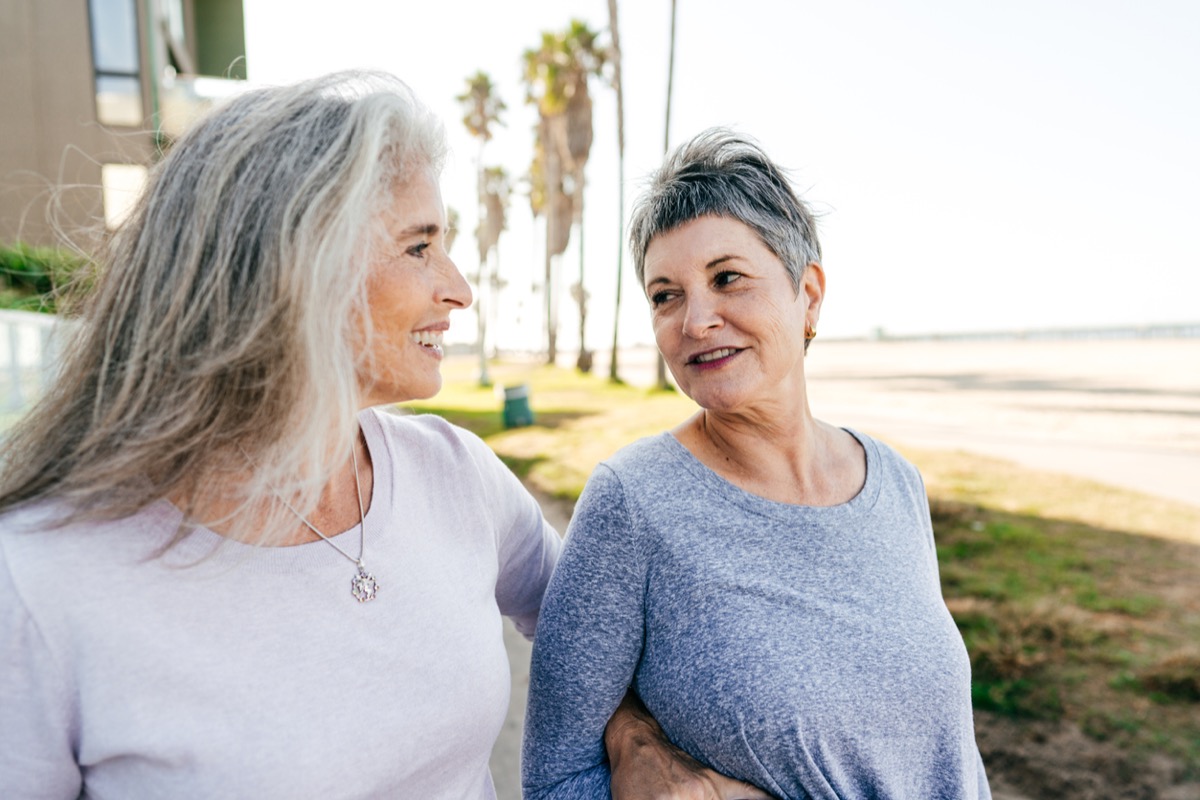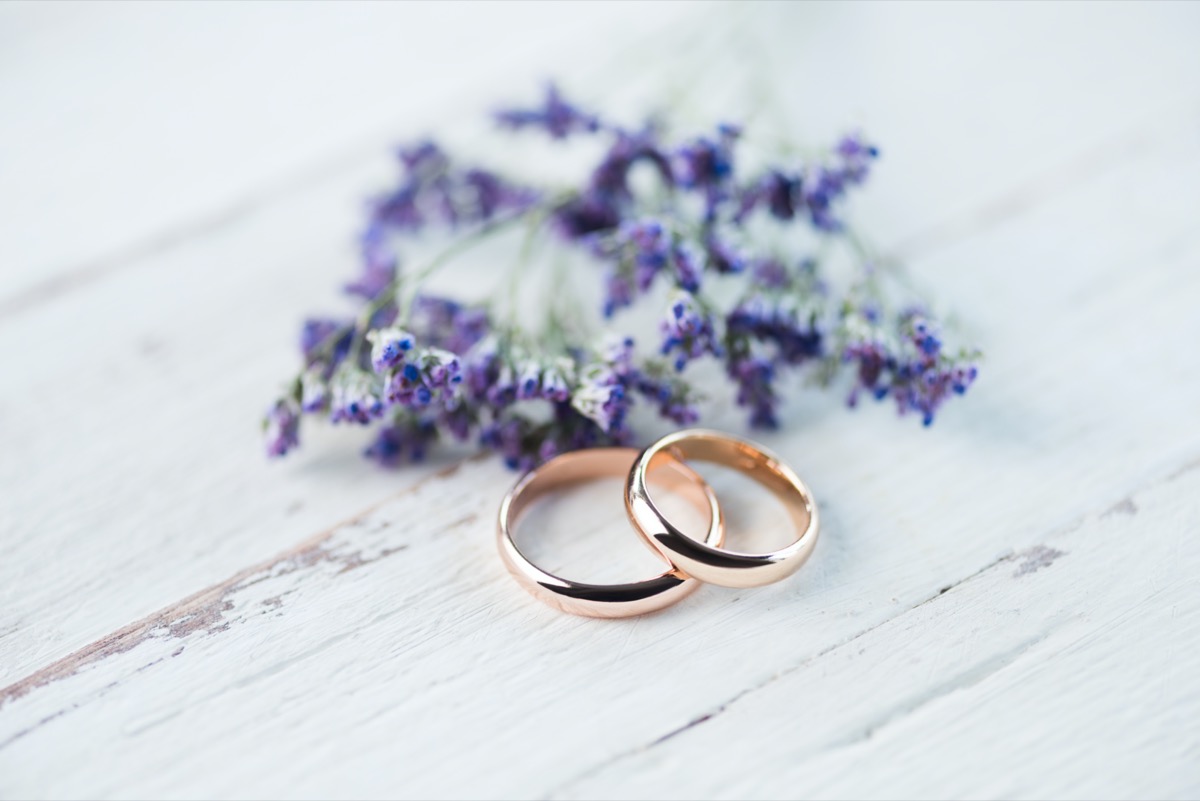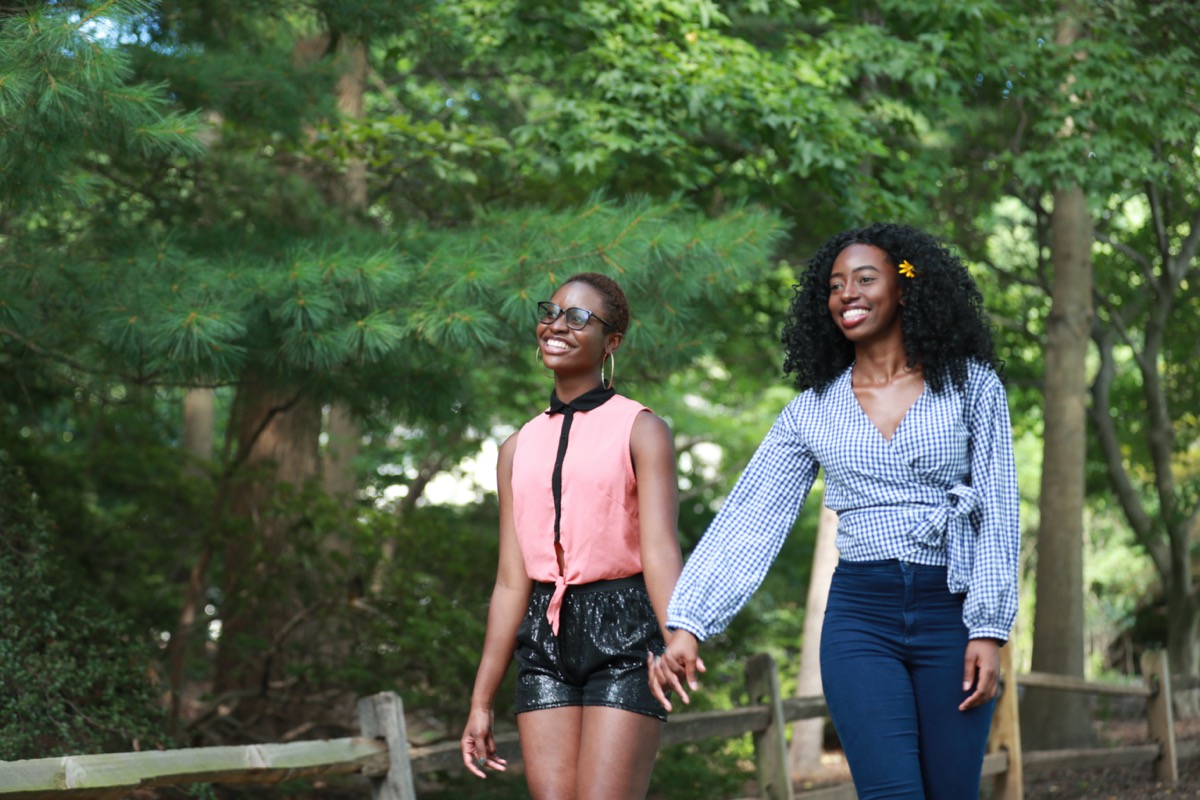Read the original article on Best Life. That feeling of euphoria you get when you fall in love is the same feeling that substance users experience, according to one study published in The Journal of Sexual Medicine. Both actions trigger the release of happy hormones like dopamine, oxytocin, and adrenaline, giving you a natural high (that you hopefully never come down from). For hints that you’re off to a good start, check out 18 Undeniable Signs a First Date Went Well. Feeling stressed? Hug it out with the person you love. One study conducted by psychiatrists at the University of North Carolina found that when couples embraced, they had increased levels of oxytocin—the hormone responsible for lower stress levels and mood boosts. Being in a loving relationship impacts your life for the better both emotionally and physically. According to one meta-analysis of more than 3.5 million people nationwide, married individuals up to the age of 50 were 12 percent less likely to experience vascular diseases compared to their divorced or single counterparts. And for more cardiovascular tips, check out This Is the Best Thing You Can Do For Your Heart Health Right Now. Humans aren’t the only species in the animal kingdom that practice monogamous relationships. Out in the wild, beavers, otters, wolves, seahorses, and barn owls are just some of the 25 Adorable Animals That Mate for Life. When you and your spouse gaze into one another’s eyes, what’s happening behind the scenes is that your heart rates are syncing up, according to research from scientists at the University of California, Davis. When they analyzed 32 heterosexual couples who sat facing one another for three minutes, the researchers found that their heart rates were nearly identical, and they speculate that this occurred because of the strong link between partners on both an emotional and physical level. According to a 2013 survey from the pew Research Center, about nine in ten of all Americans cited love as an important reason to get married, compared to just 28 percent of people who said that financial stability was an important factor in whether a couple should wed. For more relationship advice sent right to your inbox, sign up for our daily newsletter. Now more than ever, divorced individuals are finding love and happiness with new partners and remarriages. In 2013, 23 percent of married people had been divorced at least once before, compared to a much lower 13 percent in 1960. “[Romantic love] is a very powerfully wonderful addiction when things are going well,” said Helen E. Fisher, a biological anthropologist at Rutgers University, in a 2006 TED Talk. That’s because those hormones that your brain releases when you’re in love are intensely euphoric, so much so that they can make you addicted to love—and the person you’re in love with. For advice on finding someone who makes you feel this way, check out The Biggest Dating Mistake You’re Probably Still Making, Experts Say. There’s a reason that you love those sacred snuggle sessions so much. Every time you and your partner cuddle, it triggers the release of happiness hormone oxytocin to increase your mood and wellbeing. This phenomenon is so well-documented, in fact, that oxytocin is often referred to as the “cuddling hormone,” or the “love hormone.“ae0fcc31ae342fd3a1346ebb1f342fcb Though love isn’t going to be replacing modern medicine any time soon, it could come in handy if you ever find yourself in some serious pain. One study conducted by researchers at the Stanford University School of Medicine found that the warm and fuzzy feeling creates the same response in the brain as painkillers (without any of the harmful potential side effects). Even the most pessimistic people can change for the better with a little bit of love in their life, at least according to the findings of one study published in the Journal of Personality. After following 245 young couples for nine months, the scientists behind the study found that being in a relationship indirectly made neurotic partners more optimistic and self-confident, presumably thanks to all the positive emotions and experiences associated with the relationship. When it comes to love and relationships, honesty really is the best policy. One study published in the journal Personal Relationships found that the more honest couples are with one another about how their relationship is going, the more likely they are to last long-term. People might try to tell you that long-distance relationships can’t and won’t work, but the research out there says otherwise. In fact, according to one study published in the Journal of Communication, not only are long-distance relationships just as successful as regular ones, but they are also more effective in building trust and satisfaction between partners. If you want to feel closer to your spouse, then consider watching a new comedy series together. In one study published in the journal Personal Relationships, researchers concluded that couples who laughed together were more supportive of one another and more satisfied in their relationship compared to their chuckle-free counterparts. If you suffer from chronic headaches and can’t find anything to ease the pain, then love might just be the secret solution you’ve been waiting for. When researchers at the Stanford University School of Medicine gave subjects with chronic headaches a nasal spray with a dose of oxytocin, or the “love hormone,” in it, they found that 50 percent of participants reported their head pain to be cut in half after four hours, with an addition 27 percent reporting no pain at all in the same timeframe. You never know where you’ll meet the love of your life. One survey of more than 5,000 travelers conducted by HSBC found that approximately one in every 50 travelers has met their soulmate onboard a plane. Though women are often perceived as more emotional than their male counterparts, one study published in The Journal of Social Psychology found that it’s actually men who tend to fall in love and say “I love you” quicker. Though they don’t know for sure why this is, the researchers theorize that this is perhaps because females are more wary of getting their hearts broken. When the Health and Human Services Department analyzed studies that compared marriage and health, one of the shocking things that they found was that married people reported fewer doctor’s visits and shorter hospital stays. “The best logic for this is that human beings have been crafted by evolution to live in closely knit social groups,” Harry Reis, PhD, co-editor of the Encyclopedia of Human Relationships, explained to WebMD. “When that is not happening, the biological systems get overwhelmed.” Having a loved one by your side when you’re sick or injured doesn’t just provide emotional support. When researchers at Ohio State University Medical Center gave married couples blister wounds, they found that the injuries healed twice as fast when the partners shared a close bond, compared to those who were openly aggressive toward one another. Having high blood pressure, otherwise known as hypertension, has been linked to everything from heart disease to stroke. Luckily, one study published in the Annals of Behavioral Medicine found that simply being happily married contributes to low blood pressure, so don’t forget to thank your husband or wife for keeping you healthy! When Harvard researchers closely examined the progression of romantic love, they confirmed what anyone who’s ever experienced the emotion has known all along: It develops in phases of intensity, beginning with an obsession and gradually mellowing out into a more mature iteration of itself. When you find someone who makes you want to be the best version of yourself, your brain responds accordingly. According to one study published in the journal Cognitive, Affective, & Behavioral Neuroscience, the social connection that comes from being in a loving relationship activates the part of the brain that’s responsible for selflessness and emotional processing. “For both men and women, how someone smells and whether you are innately drawn to that scent goes a long way in determining your attraction,” relationship therapist Rhonda Milrad, LCSW, explained to Bustle. That’s all thanks to pheromones, chemicals secreted in sweat that can spur sexual arousal. The next time one of your friends tries to tell you that true love doesn’t exist, just tell them to look up Herbert and Zelmyra Fisher. According to Guinness World Records, the late couple broke the record for the longest marriage in history back in February 2011, having been married at that point for a staggering 86 years and 290 days. As for the secret to their success, the couple once said, “There’s no secret to our marriage—we just did what was needed for each other and our family.” Like escape from jail to spend time with the person you love. Or at least, that’s exactly what happened with Joseph Andrew Dekenipp, a prisoner in Arizona who broke out of his jail cell just to meet his girlfriend on Valentine’s Day. If you’ve yet to find your soulmate on a site like Match.com or OKCupid, don’t give up just yet. According to a 2020 Pew Research survey, 12 percent of Americans reported finding their spouse or partner on a dating site. Before she was the Queen of Norway, Queen Sonja was the daughter of a clothing merchant, dating then-Crown Prince Harald in secret. However, Harald eventually made it clear to his father that he would never get married unless the person by his side was Sonja, and the couple wed on August 29, 1968. Sometimes love can conquer all! Have you ever wondered why you see so many roses around Valentine’s Day? That’s because the bright flowers are the official favorite of Venus, the Roman goddess of love. Don’t expect your one night stand to turn into something more, at least scientifically speaking. Studies have shown that while being in love activates the regions in the brain connected to empathy, pure and unadulterated lust is connected to the similar but different areas of the brain associated with motivation and reward. First comes love, then comes marriage—and then comes living longer. According to one study published in the Journal of Marriage and Family, married individuals were 58 percent less likely to die over an eight-year period compared to those who had never made it to the altar. According to a study in the Personality and Social Psychology Bulletin, your personal well-being increases as you increase the time you put into your romantic relationship. (However, the benefits aren’t the same if you’re not already pretty happy with your partner.) Per Psychology Today, “Mindfulness and compassion meditations increase activity in brain centers connected with empathy and positive emotions, decrease activation of our fear centers, and make our brains more interconnected—a trait associated with the secure attachment pattern.” In other words, the more you practice compassion for your partner, the easier it will be to understand where they’re coming from and the more connected you’ll feel. Betty Everett (and Cher) were right: it’s in his kiss. A study in the journal Arch Sex Behavior determined that men and women use early lip-locks to determine whether or not a potential match is right for them, though women put more emphasis on them. The study also states that kissing is also highly valued by couples in long-term relationships, as it helps to keep bonds strong. A 2017 study reported by Psychology Today found that “love at first sight” isn’t always just a case of looking at the past with rose-colored glasses. Respondents did immediately report falling in love at first sight with potential partners, with men more likely to do so than women. Granted, those strong, initial feelings don’t encapsulate all of what romantic love is, but they can prompt a person to pursue something deeper. That fluttery feeling you get in your stomach when you meet someone new isn’t a sign that you’ll be together forever. It’s merely a physiological lust response, scientists told NBC News. So there’s no need to worry if you feel calm instead of jittery when your partner walks through the door. “True love is a well-being experience that does not include nervousness or excitement,” neuroscientist Nicole Gravagna, PhD explained, adding that dopamine and endorphins “drop to only mildly elevated levels compared to the pre-relationship level” after the five-year relationship mark.











